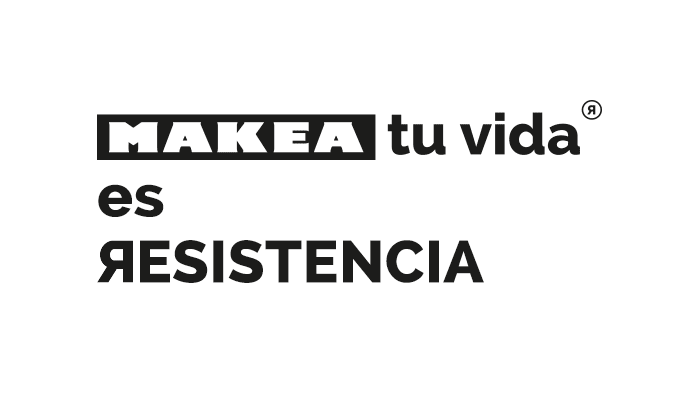
WHO WE ARE
Alberto Flores
Mireia Juan
Ana Pérez
USUAL COLLABORATORS
Albert Capella
Francesco Intrieri
Elliot Alcalde
Santiago Doljanin
CONTRIBUTORS
José Puchaes
Pablo Valls
Juanjo Ibañez
Misha Morozov
Mario Pedret
Sergio Acedo
Jordi Durà
David Penya
María Molsosa
Ari Tadani
Fran Palau
Eva del Cotillo
Verónica Pérez
Alba Casanova
Lucas Alvarez
Alba Fernández
Patricia Soto
Ariadna Rubio
Guifré Tasies
Sandra Mediavilla
Irene Santiago
Susana Gallego
Luís García
Ferrán Noguera
Rebeca Ros
Clara Garofalo
Giulia Valente
Ana Guerrero
Andrés Costa
David Orriols
Josephine Bonnotte
Mar Aragonés
…
Makea (Glow Up/Hack/Design/Beautify Your Life) is a non-profit organisation, with a focus on social issues and education, that promotes the use of design in social transformations. Makea Tu Vida encourages open design, knowledge-sharing and collective creativity, applying each of these principles to a range of upcycling and repurposing projects in various contexts and situations.
Makea Tu Vida was first established as an action-oriented group in 2006 and then as a formal entity in 2008. Since then, we have specialised in the development of design dynamics and processes of collective creation that encourage citizens to actively participate in shaping their environment. Our work is based on repurposing as a technique and open design as a tool.
Our practice focuses on creating activities, strategies and prototypes that help us to think about the transformative possibilities of design and contribute to building a more socially and environmentally responsible society.
Over the years, we have focused on leading workshops to collectively create messages, furnishings, social platforms (both digital and physical), structures and objects. We also workshop the creation of participatory strategies that shine light on issues of wastefulness, resource management, consumer habits and the many ways in which our Habitat is transformed in public, community and private spaces.
Makea Tu Vida aims to:
- promote the use of design in social transformation.
- highlight issues of wastefulness, resource management, consumer habits and the many ways in which our Habitat is transformed in public, community and private spaces.
- propose and explore constructive solutions by experimenting with and prototyping objects that are made by repurposing discarded materials.
- create dynamics of co-creation and collaborative design that motivate DIY creation as a tool of reflection, social consciousness and environmental awareness.
- create and develop collaborative platforms to foster a culture of reuse and idea sharing.
- enable the use of open-source design tools and methodologies.
- develop DIY/DIWO (do it yourself/do it with others) culture as a practical method of individual and collective empowerment.